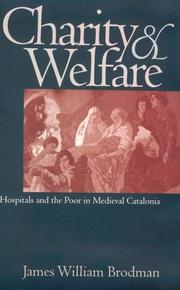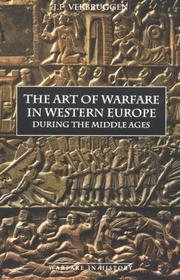| Listing 1 - 10 of 71 | << page >> |
Sort by
|
Book
ISBN: 150171869X Year: 1998 Publisher: Ithaca, NY [u.a.] Baltimore, Md. : Cornell Univ. Press Project MUSE,
Abstract | Keywords | Export | Availability | Bookmark
 Loading...
Loading...Choose an application
- Reference Manager
- EndNote
- RefWorks (Direct export to RefWorks)
Books have rarely been written about the history of any emotion except love and shame, and this volume is the very first on the meaning of anger in the Middle Ages. Well aware of modern theories about the nature of anger, the authors consider the role of anger in the social lives and conceptual universes of a varied and significant cross-section of medieval people: monks, saints, kings, lords, and peasants. They are careful to distinguish between texts (the sources on which historians must rely) and the reality behind the texts. They are sensitive, as well, to the differences between ideals and normative behavior.The first eight essays in the volume focus on anger in the Latin West, while the last two turn to the fringes of Europe (the Celtic and Islamic worlds) for purposes of comparison. Barbara H. Rosenwein concludes the volume with an essay on modern conceptions of anger and their implications for understanding its role in the Middle Ages. The essays reveal much that is new about medieval rituals of honor and status and illuminate the rationales behind such seemingly irrational practices as cursing, feuding, and the punishment of blinding.Contributors: Gerd Althoff, University of Münster; Richard E. Barton, Yale University; Geneviéve Bührer-Thierry, University of Marne-la-Vallée; Wendy Davies, University College London; Paul Freedman, Yale University; Zouhair Ghazzal, Loyola University, Chicago; Paul Hyams, Cornell University; Lester K. Little, Smith College; Catherine Peyroux, Duke University; Barbara H. Rosenwein, Loyola University, Chicago; Stephen D. White, Emory University
Sozialgeschichte 500-1500. --- Zorn. --- Wut. --- Social history --- Anger --- History.
Book
Year: 1998 Publisher: Ithaca, N. Y. London Cornell University Press
Abstract | Keywords | Export | Availability | Bookmark
 Loading...
Loading...Choose an application
- Reference Manager
- EndNote
- RefWorks (Direct export to RefWorks)
Anger --- History --- Social history --- Middle Ages, 500-1500 --- Anger - History.

ISBN: 0812234367 Year: 1998 Volume: *43 Publisher: Philadelphia, Pa University of Pennsylvania Press
Abstract | Keywords | Export | Availability | Bookmark
 Loading...
Loading...Choose an application
- Reference Manager
- EndNote
- RefWorks (Direct export to RefWorks)
History of Spain --- anno 1400-1499 --- anno 1300-1399 --- Catalonia --- Social history --- Medieval, 500-1500 --- Charities --- Spain --- Catalonia (Spain) --- History --- Hospitals [Medieval ] --- Middle Ages, 500-1500

ISBN: 0582494672 0582494664 Year: 1998 Publisher: London Longman
Abstract | Keywords | Export | Availability | Bookmark
 Loading...
Loading...Choose an application
- Reference Manager
- EndNote
- RefWorks (Direct export to RefWorks)
27 "04/14" --- Kerkgeschiedenis--Middeleeuwen --- Church history --- Middle Ages, 600-1500 --- Middle Ages, 500-1500 --- Christianity
Book
ISBN: 0340601183 Year: 1998 Publisher: London ; New York ; Auckland Arnold
Abstract | Keywords | Export | Availability | Bookmark
 Loading...
Loading...Choose an application
- Reference Manager
- EndNote
- RefWorks (Direct export to RefWorks)
27 "04/14" --- Kerkgeschiedenis--Middeleeuwen --- Church history --- Middle Ages, 600-1500 --- Europe --- 600-1500 --- Middle Ages, 500-1500
Book
ISBN: 2852037408 9782852037403 Year: 1998 Volume: 2 Publisher: Paris H. Champion
Abstract | Keywords | Export | Availability | Bookmark
 Loading...
Loading...Choose an application
- Reference Manager
- EndNote
- RefWorks (Direct export to RefWorks)
Social classes --- Elite (Social sciences) --- Classes sociales --- Elite (Sciences sociales) --- History --- Histoire --- Dijon (France) --- Social conditions --- Conditions sociales --- Histoire sociale --- Structure sociale --- Upper class --- France --- Dijon --- Social life and customs --- Middle Ages, 500-1500 --- Elite (Sciences sociales) - France - Dijon - Histoire - 500-1500 (Moyen Age) --- Histoire sociale - 500-1500 (Moyen Age) --- Structure sociale - France - Dijon - Histoire - 500-1500 (Moyen Age) --- Social history --- Elites (Social sciences) --- Leadership --- Power (Social sciences) --- Social groups --- Social conditions. --- Mediaeval Social History

ISBN: 352535455X 9783525354551 Year: 1998 Volume: 140 Publisher: Göttingen Vandenhoeck
Abstract | Keywords | Export | Availability | Bookmark
 Loading...
Loading...Choose an application
- Reference Manager
- EndNote
- RefWorks (Direct export to RefWorks)
Economic history --- Histoire économique --- -Economic conditions --- History, Economic --- Economics --- -Economic history --- Histoire économique --- Economic history - Medieval, 500-1500

ISBN: 0851155707 9780851155708 Year: 1998 Volume: *3 Publisher: Woodbridge, Suffolk, UK Rochester, NY, USA Boydell Press
Abstract | Keywords | Export | Availability | Bookmark
 Loading...
Loading...Choose an application
- Reference Manager
- EndNote
- RefWorks (Direct export to RefWorks)
Histoire militaire -- Moyen-Age --- Histoire militaire médiévale --- Krijgsgeschiedenis -- Middeleeuwen --- Krijgsgeschiedenis [Middeleeuwse ] --- Medieval military history --- Middeleeuwen -- Krijgsgeschiedenis --- Middeleeuwse krijgsgeschiedenis --- Military history [Medieval ] --- Moyen-Age -- Histoire militaire --- Military art and science --- Military history, Medieval --- Europe --- History --- History, Military --- Medieval, 500-1500 --- History [Military ] --- Middle Ages, 500-1500 --- Military art and science - History - Medieval, 500-1500 --- Europe - History, Military

ISBN: 0812216547 0812292316 9780812216547 Year: 1998 Publisher: Philadelphia (Pa.): University of Pennsylvania Press
Abstract | Keywords | Export | Availability | Bookmark
 Loading...
Loading...Choose an application
- Reference Manager
- EndNote
- RefWorks (Direct export to RefWorks)
Seldom heard from in modern times, those on the margins of Medieval Europe have much to tell us about the society that defined them. More than just a fascinating cast of characters, the visionaries and sexual dissidents, the suicidal and psychologically unbalanced, the lepers and converts of Medieval times reveal the fears of a people for whom life was made both meaningful and terrifying by the sacred. After centuries of historical silence, these and other disenfranchised members of the medieval public have been given voice by Michael Goodich in a unique collection of texts from the mid-eleventh through the fourteenth century. Translated from their original Latin, Hebrew, and Arabic, these texts, many of them first person narratives or testimonies, give insight into those figures who made Medieval society uneasy. The book is divided into chapters dealing with the Jewish community, apostates and converts, sexual nonconformists, victims of the Devil, Christian heretics, and the liminal and temporarily marginalized. The texts included both give spiritual voice to such groups, and illuminate the more mundane affairs of their daily lives—child rearing, social life, economic difficulties, sexuality, dreams, emotional instability, and gender relations among them.
Marginaliteit [Sociale ] in de literatuur --- Marginality [Social ] in literature --- Marginalité sociale dans la littérature --- Marginality, Social, in literature --- Medieval, 500-1500 --- Marginality, Social, in literature. --- Marginality, Social --- Social history --- Exclusion, Social --- Marginal peoples --- Social exclusion --- Social marginality --- Assimilation (Sociology) --- Culture conflict --- Social isolation --- Sociology --- People with social disabilities --- History --- Sources --- Middle Ages, 500-1500 --- Social history - Medieval, 500-1500 - Sources --- Marginality, Social - Europe - History - Sources --- SOCIAL HISTORY --- SOCIAL MARGINALITY IN LITERATURE --- MIDDLE AGES
Book
ISBN: 395211281X Year: 1998 Publisher: St. Gallen Stiftsarchiv
Abstract | Keywords | Export | Availability | Bookmark
 Loading...
Loading...Choose an application
- Reference Manager
- EndNote
- RefWorks (Direct export to RefWorks)
| Listing 1 - 10 of 71 | << page >> |
Sort by
|

 Search
Search Feedback
Feedback About UniCat
About UniCat  Help
Help News
News